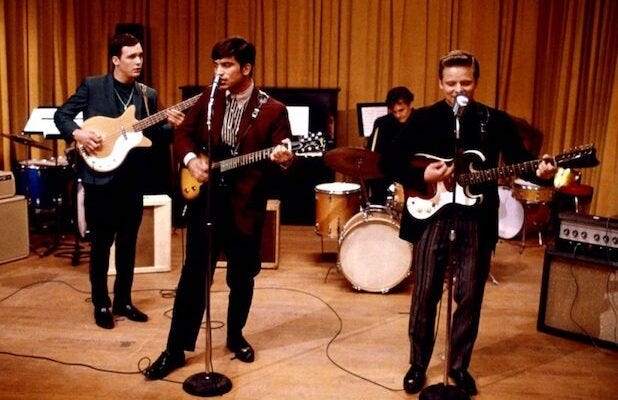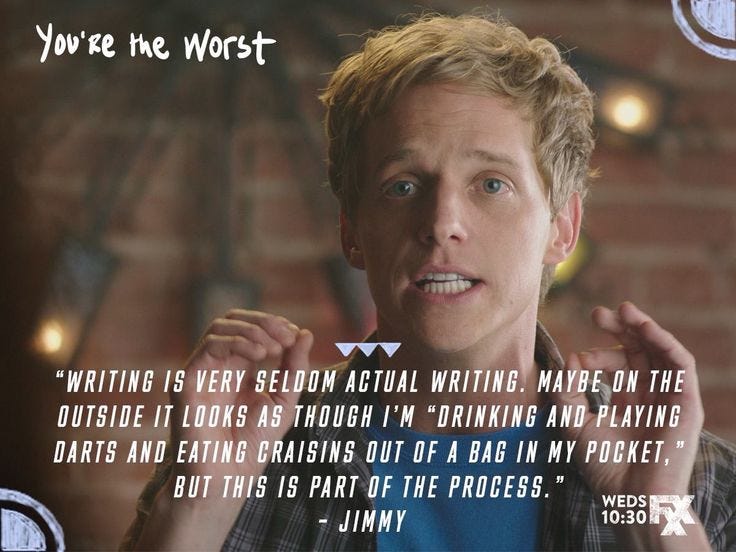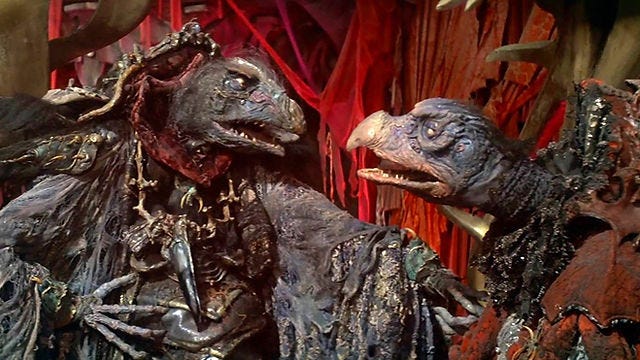Still Processing
PLUS: The Akela Cooper recording
The Worst
I’m so glad so many of you had such a positive reaction to last week’s newsletter about process. I find the creative process endlessly fascinating. (As proven by, y’know, like 1000 podcast episodes about it). But I think many of us do love learning how other writers work because we’re always searching for some key that will unlock our own process.
Stephen Falk puts it in a way that only the creator of You’re the Worst could:
When I decided to become a writer because I was a failed actor, I very much decided to become a student of not just the industry but the activity. One of my favorite things to hear—it’s like porn to me—is peoples’ writing habits. I find it fucking fascinating.
I love it and I feel like everyone fucking lies.
You read these things in, like, the New York Times like, “When do you write?” and the author’s response is, “Oh, I write best from 4am to 11am, then I take a walk, then I write from 1 to 8pm. And I consider that a good day and I pat myself on the—”
Fuck you! No. Bullshit.
Writing is very hit and miss. It’s absolutely awful. I’ll maybe get 2 hours in and then, I don’t know, there’s lunch. Then there’s a lot of pornography on the internet.
What I Do
It took me some time to refine my own process, but I’ve gotten it to the place where I look forward to each part of it, knowing that every step takes me closer to a finished project. I’ve also managed to find a way to keep each step brief enough that I don’t get tired or bored with any one action.
I thought I might break down my own process over the next couple of weeks in the hope that you find some part of it useful to your own.
The Very Idea
One of the more common questions at writer Q&As is “where do you get your ideas?” This is a question that I never ask. If you’re a creative person, then you get it.
Ideas are everywhere.
We don’t always know what sparks a specific notion for a story, but we know when one takes hold. It’s the idea that keeps rising to the surface while you’re going about your daily life. It’s the image that you can’t shake or the question that you want to explore. When you wake up at 3am, it’s the idea that keeps you from falling back to sleep, turning it over and over, mapping its facets or following its multiverse of possibilities.
For me, it’s usually a basic premise. One sentence, easy to understand. I’ll give you an example based on a script that my partner and I wrote.
This idea actually came from my wife. We were playing “make a horror movie out of X+Y,” whereby X and Y are two movies that don’t seem to go together. Julie pitched me That Thing You Do + Speed.


We laughed about it. But I found that I could not stop thinking about the story that might come out of this. I latched onto the core of each movie. That Thing You Do is about the interpersonal conflicts of a band. Speed is about a bus that can’t slow down or it’ll explode. Okay, so:
A band can’t stop playing or they’ll die.
That basic premise leads to more questions, right?
Why will they die? Because monsters. (I love creature movies).
What keeps the monsters at bay? Just the playing of music? It has to be more difficult than that. They have to play hard, loud, fast.
Who’s in the band? What are the monsters? What am I really writing about?
This last question is the most important and most exciting one. How does this horror movie function as a metaphor for the basic human truth I want to explore?
Early Days
These early days of noodling on an idea—without writing anything down—are filled with limitless possibility. Many new writers I talk to find this frustrating. “When do you know you’ve made the right choice for your story?” As I wrote about a few months ago, if you do it enough, you just know. But, really, if the direction you’re headed excites you, then it’s probably right.
This part of the process is the bit that looks the least like “actual work.” I always feel bad for Julie during the part, because for days or weeks, I’m really living in my own head. I’m chipping away at the marble to find the shape already underneath.
For many creative people, this can resemble writer’s block. Because it’s as difficult as it is fulfilling. You’re scratching at an itch that you can’t quite find.
When I was in New Zealand in 2015, I scheduled a Writers Panel recording with Luther creator Neil Cross, who was a fun and lovely interview. Neil recalled reading an article about the daily habits of creative people. “They had very little in common,” he said, “but the things they had in common were coffee and showers, and walks.”
Indeed, these three activities—coffee, walks, showers—come up a lot in Writers Panel interviews about ideation. These are rote activities during which you can let your mind wander.
Blacklist favorite screenwriter Will Widger (The Munchkin) goes on “long walks to sort of think about the story.”
The “sort of” is telling. The trick, I think, is not to think about the idea you’re trying to crack but rather to think of nothing. Go through your routine. Live your life.
“If your brain is really jamming on an idea,” says Cougar Town and Enlisted creator Kevin Biegel, then “you're always working on it. Your subconscious is always going to be thinking about it. So even if your conscious brain is like, I can't figure this scene or character or beat out, it's always great to step away. Give yourself a day, give yourself a week, whatever it is. Because, in that time, your subconscious is still cooking and that's why you'll be walking along and boom, you'll go, Oh shit, I know how to fix it.”
Deep Background
It took almost a year for me to get to the script writing phase of the “That Thing You Do + Speed” movie I talked about. Because it took that long for me to realize that the story was personal.
I knew that Loud Fast Rules, as it came to be titled, was about a band coming apart because the lead characters were headed in different creative directions. I came to realize that both of these characters, a brother and sister, were me. I ended up writing a horror movie about my desire to write more personal, emotional stories through the metaphors of horror movies.
Obviously, during the year I was noodling on Loud Fast Rules, I was working on a lot of other projects. All the while, though, I was “background processing” this movie, a term Javier Grillo-Marxuach (Dark Crystal: Age of Resistance; Lost) brought up in detailing his own process:
People say, “it’s a discipline! You get up every day and you write, from 8 am to 12 in the afternoon, and then you have 12 novels, and that’s how I did it!”
I don’t write unless I have to write. Now, that doesn’t mean I don’t spend the rest of my time trying to fill my mind with books and TV and internet and Facebook and crap. But if I'm breaking a story or whatever, I do wait for the critical mass point when I have to hunker down. Maybe a lot of the not-writing I do is the background processing of that, which, some people have to fill that up with journaling or whatever it is.
A lot of people tell you, “write from 8 in the morning to 12 noon, never fail, never waver,” and some people like me will tell you, “wait until you reach critical mass and then put your story down.” The bottom line is, know thyself. Know what your process is like and honor it.
For me, if I can’t write, I don’t sit there bashing my head against the wall. I just take a step back, wait until the moment is right, and then do it. And sadly, sometimes the moment is right at 3 in the morning, but that’s the price that I pay for being able to say, “no I'm not going to write today because it’s just going to be crap and I'm background processing something else.” And then it all comes out.
So, take the time ideate while you do your other stuff. Build up that critical mass of decisions around your idea. You’ll know when it’s time for your next step, which might be going to script, like Javi, or, like me, you might want to just start scribbling stuff in a notebook.
Next week: notebooks!





